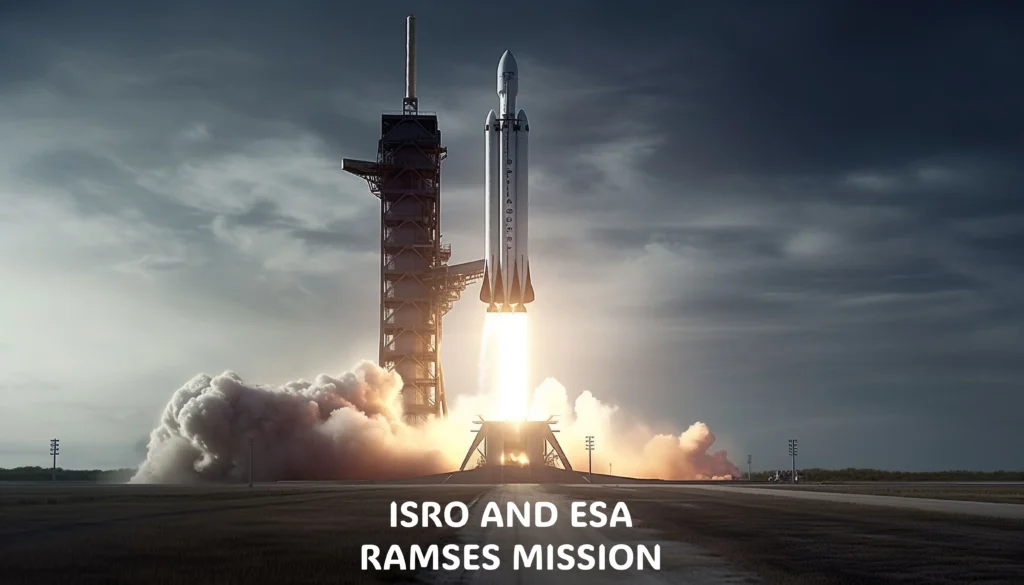
ESA and ISRO Plan Collaboration on Ramses Mission to Study Asteroid Apophis
The European Space Agency (ESA) and the Indian Space Research Organization (ISRO) are preparing to collaborate on an exciting new mission named Ramses. This mission aims to track and investigate the asteroid Apophis, which is predicted to come close to Earth in 2029.
Recently, S. Somanath, Chairman of ISRO, expressed India’s intention to “meet the asteroid” as it approaches Earth. Although he did not initially clarify whether ISRO would collaborate with other space agencies or pursue its own independent mission, the development has sparked significant interest.
In a recent parliamentary update, Science and Technology Minister Jitendra Singh confirmed that discussions between ISRO and ESA are underway to collaborate on the Rapid Apophis Mission for Security and Safety (Ramses). He mentioned that further meetings involving scientists from both organizations are anticipated to define how their respective strengths could be utilized in the mission.
ESA’s commitment to studying Apophis, following NASA’s similar efforts with the OSIRIS-REx and APEX probes, represents a significant step in asteroid research. The asteroid, approximately 375 meters in diameter, will pass within 32,000 kilometers of Earth in 2029. This close proximity offers a rare opportunity for detailed study, as such close encounters occur only once in 5,000 to 10,000 years. The Ramses spacecraft will approach Apophis before its closest approach to Earth and monitor its trajectory for an extended period.
Advancing Planetary Defense: ISRO's Plans for Asteroid Research and Collaboration
While dedicated space missions to study asteroids—rocky remnants from the early Solar System—have been relatively rare, this is starting to change. Currently, numerous asteroids enter Earth’s atmosphere daily. However, due to intense air friction, most of them disintegrate before reaching the ground. Occasionally, fragments of a few asteroids manage to reach Earth each year, though they generally leave minimal impact. The potential threat posed by a massive asteroid hitting Earth is significant, with the extinction event that wiped out the dinosaurs 6.5 million years ago believed to be the result of such a collision.
In light of this, ISRO is preparing to venture into the field of planetary defense, a domain it has not previously explored in depth. The ultimate aim of establishing a planetary defense program is not merely to investigate asteroids but to prevent any space object, including asteroids and comets, from striking Earth—since such an impact could have catastrophic consequences.
NASA demonstrated the potential for planetary defense in 2022 by directing a spacecraft to collide with the asteroid Dimorphos, successfully altering its trajectory. Notably, Dimorphos posed no danger to Earth, but this test showcased the feasibility of asteroid deflection techniques.
According to Minister Jitendra Singh, ISRO has embarked on several initiatives aimed at developing planetary defense capabilities. As part of its IS4OM (ISRO System for Safe and Sustainable Space Operations Management) program, ISRO is focusing on building expertise in asteroid observation and planetary defense. Initial observational efforts have been made using existing astronomical telescopes in India. The long-term plan includes establishing dedicated telescopes for asteroid monitoring, analyzing asteroid paths, and characterizing their composition, size, and shape to assess impact risks and provide advance warnings.
Additionally, ISRO aims to join the International Asteroid Warning Network (IAWN) and the Space Mission Planning Advisory Group (SMPAG), both of which operate under the United Nations. These organizations are involved in scientific research related to asteroid impact potential and coordinate global efforts to mitigate impact hazards. By joining these networks, ISRO will gain access to advanced technological developments and benefit from interactions with global experts in asteroid studies and impact risk mitigation.
Looking ahead, Singh expressed optimism about future collaborations. ISRO plans to work with other major space agencies, including NASA, ESA (European Space Agency), and JAXA (Japan Aerospace Exploration Agency), on planetary defense projects.
Share this post :
KTR Accuses Revanth Reddy’s Brother-in-Law of Securing Lucrative Government Contracts with Minimal Business Background
NASA says: Two Big Space Rocks To Dangerously Flyby Earth Today
Wayanad Landslides- Army Rescues Thousands From Cloudburst, Managed To Save More Than 190 Others
Incredible image from NASA’s Juno mission shows Jupiter as we’ve never seen it before
Subscribe our newsletter
Purus ut praesent facilisi dictumst sollicitudin cubilia ridiculus.
